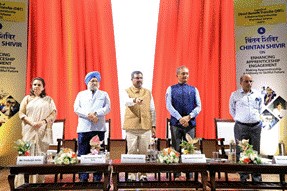TBB BUREAU
NEW DELHI, AUG 12, 2023
 To bolster the participation of both industries and young individuals in apprenticeship training on a nationwide scale, Union Minister for Education and Skill Development & Entrepreneurship Dharmendra Pradhan, today launched Direct Benefit Transfer (DBT) in National Apprenticeship Promotion Scheme (NAPS). An amount of approximately Rs. 15 crore was disbursed to one lakh apprentices by the Minister marking the launch of DBT in NAPS.
To bolster the participation of both industries and young individuals in apprenticeship training on a nationwide scale, Union Minister for Education and Skill Development & Entrepreneurship Dharmendra Pradhan, today launched Direct Benefit Transfer (DBT) in National Apprenticeship Promotion Scheme (NAPS). An amount of approximately Rs. 15 crore was disbursed to one lakh apprentices by the Minister marking the launch of DBT in NAPS.
A total of 25 lakh youth have been engaged as apprentices since the inception of National Apprenticeship Promotion Scheme in 2016, till 31st July 2023. Around 2.6 lakh Apprentices have completed training in FY 23-24.
The Government of India’s proactive efforts to promote quality training across sectors, led to the number of active establishments subsequently increase from 6,755 in 2018-19 to 40,655 in 2023-24.
Lauding the initiative, Pradhan said, “Today is a momentous day towards invigorating the apprenticeship ecosystem in our country. Launch of DBT in National Apprenticeship Promotion Scheme is a big step towards fulfilling our Prime Minister Shri Narendra Modi’s vision of making skilling an apprenticeship aspirational as well as encouraging earning while learning as envisioned in NEP.” He congratulated all the 1 lakh apprentices who have received stipend through DBT today.
Atul Kumar Tiwari, Secretary, Ministry of Skill Development & Entrepreneurship said, “Empowering our nation’s youth with skills is at the heart of our vision, and the introduction of Direct Benefit Transfer (DBT) through NAPS marks a stride towards transparency and efficiency. A skilled workforce is paramount, and our multifaceted strategy, encompassing policy evolution, industry synergies, and heightened recognition. In harmony with India’s core values of inclusivity and diversity, today’s Chintan Shivir on Apprenticeship underscores a crucial mission.” Together, we forge ahead to craft a future where every individual’s potential finds its truest expression, he added.
Pradhan interacted with some of the vibrant industry clusters and enthusiastic apprentices across Maharashtra, Telangana, Himachal Pradesh, Kerala, Haryana, Uttar Pradesh. There has been more 488 per cent increase in number of establishments who have started apprenticeship training since the commencement of NAPS. This increased adoption of apprenticeship training will strengthen our nation’s workforce and economy. Some of them were Mahratta Chamber of Commerce, Industries and Agriculture (MCCIA), Baddi Cluster from Himachal Pradesh and North Malabar Consortium Industry cluster
The MSDE also organized the Chintan Shivir on “Enhancing Apprenticeship Engagement” to elevate the uptake of apprenticeship programs among all stakeholders. A core facet of this session is to amplify the role and responsibility of various entities, including other central and state governments, industry bodies, and the private sector.
The Chintan Shivir was divided in three breakout sessions themed on Stakeholder Convergences to Make Apprenticeship Aspirational, Strategies and Practices to promote Quality Apprenticeship, and Creating a Diverse and Inclusive Apprenticeship Ecosystem, respectively.
The deliberations were centered around Fostering dialogue exchange on apprenticeship; Increase uptake of apprenticeship; and Quality enhancement.
With the implementation of NAPS, the Government of India reimburses 25 per cent of the prescribed stipend — subject to a maximum of Rs. 1500 per month per apprentice — that all employers undertake by engaging apprentices. With the implementation of NAPS, it has been noted that not all establishments seek partial reimbursement of stipend by the Government. Going by past trends, 30 per cent of target apprentices, under NAPS 2.0, will be paid their stipend by Government of India. With the implementation of DBT, the number of apprentices is expected to increase. Accordingly, the percentage of apprentices covered will be going up beyond 30 per cent.
 The Business Bytes
The Business Bytes
